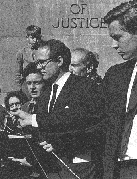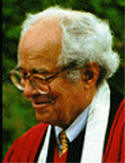|
|||||||||||
|
Once
to every man and nation,
|
|||||||||||
|
Coffin attended Yale University School of Music for one year before enlisting in the United States Army. Coffin served in the army until 1947, rising to the rank of captain while working as a liaison with the French and Soviet armies. He returned to the university upon his discharge and received his B.A. in 1949. Coffin spent the next year studying at Union Theological Seminary, then joined the Central Intelligence Agency for a three year period. Coffin returned to Yale once again in 1953, this time attending the divinity school, from which he received a B.D. in 1956. That same year he was ordained as Presbyterian minister. Coffin then served as chaplain of Phillips Andover Academy and Williams College in successive one year periods, before returning to Yale in 1958 to succeed Sidney Lovett as university chaplain, a position he held until 1975. While chaplain at Yale, Coffin emerged as a public figure involved in numerous prominent events, activities, and organizations. He became involved in international relief work, beginning with Operation Crossroads Africa. On behalf of that group, he led a group of students to Guinea in the summer of 1960. The following year, Coffin was appointed to the President's Advisory Committee on the Peace Corps and established its training program. He trained the first group of Peace Corps volunteers in Puerto Rico during the summer of 1961. Coffin also became a prominent figure in the civil rights movement in the early 1960s. He was one of the “Freedom Riders,” a group of black and white activists who rode interstate buses in the South to challenge segregation laws. Following one of these rides in May of 1961, he was arrested in Montgomery, Alabama, along with six other demonstrators, and charged with disturbing the peace. He was also arrested on several other occasions for direct actions against segregation laws. In addition to his direct participation in civil rights protests in the South, Coffin recruited and coordinated the work of many northern activists, particularly white students, and he was also a member of the Connecticut Advisory Board of the United States Commission on Civil Rights. With the escalation of military actions in Vietnam, Coffin became heavily involved in the protests against the war. His activism began in 1965 with the formation of Americans For Re-appraisal of Far Eastern Policy, a group founded by Coffin and Allard Lowenstein that pushed for United States recognition of the People's Republic of China, the admission of China into the United Nations, and a cease-fire in Vietnam. Later that year, Coffin joined with a group of religious leaders, including John Bennett, Abraham Heschel, and Daniel Berrigan, to form the National Emergency Committee of Clergy Concerned About Vietnam. Coffin was named executive secretary of the organization. Initially, the group adopted a relatively moderate stance, recommending traditional political action and persuasion to affect change in U.S. policy toward Vietnam. As the war in Vietnam escalated and lay people became interested in the work of the group, it changed its name to Clergy and Laity Concerned About Vietnam (CALCAV). CALCAV organized mobilizations, supported conscientious objectors and acts of civil disobedience, and urged members to offer draft resisters sanctuary in churches and synagogues. During this time, Coffin became a frequent speaker at anti-war rallies and a highly public figure. At an October 1967 protest in Boston, over 1000 draft resisters turned in their draft cards at a church service led by Coffin. Later that month, he and a number of other activists who had collected cards throughout the country, presented them to officials at the Department of Justice in Washington. As a result of these actions, Coffin was indicted along with Benjamin Spock, Marcus Raskin, Mitchell Goodman, and Michael Ferber on charges of conspiracy to aid draft resisters. They were convicted in 1968, but the charges were dropped in 1970 after the verdict was overturned on appeal. Coffin continued to protest against the war, and even traveled to North Vietnam in 1972 to accompany three released prisoners on their trip back to the United States. In the war's final stages and after its end, Coffin was an outspoken proponent of the granting of amnesty for draft resisters. Throughout his tenure at Yale, Coffin's actions met with mixed reviews among Yale students, administrators, and alumni. Many older alumni and other conservative Yale factions called for his resignation or removal. While Kingman Brewster, Yale's president, disagreed with Coffin's methods of protest, particularly his stand on and involvement in civil disobedience, he stood behind Coffin's rights to free speech and held that Coffin's influence on Yale was generally positive. Coffin left Yale in December 1975, citing the need to remove himself from the academy in order to work on a global level for social justice, disarmament, and an end to hunger.
Coffin married Eva Rubinstein, a ballet dancer and the daughter of Arthur Rubinstein, in 1956 and they had three children: Amy, Alexander, and David. They were divorced in 1968. Coffin re-married in 1969, to Harriet Gibney; they divorced shortly after he left Yale.Coffin's third wife is Virginia Randolph Witson After becoming president emeritus of SANE/FREEZE in the mid-1990s, Coffin moved to Vermont and continued to teach and lecture.
[The
biographical information above is excerpted form the: "Guide to the William Sloane Coffin, Jr. Papers, Manuscript Group 1665" compiled by Tom Hyry ] |
|||||||||||

